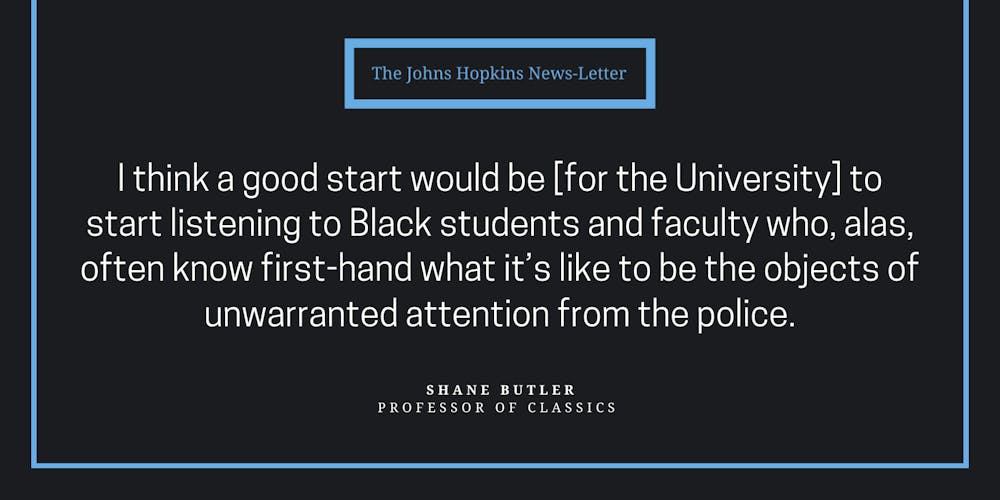The University’s plans for the Johns Hopkins Police Department (JHPD) have sparked discourse among members of the Hopkins community — including faculty members.
Following the recent developments with the JHPD, The News-Letter interviewed University faculty to discuss their views on the JHPD’s impacts on the Hopkins community.
As the University continues forward with the implementation of the Johns Hopkins Police Department (JHPD), many faculty, students and community members have spoken about the armed private police force.
In an interview with The News-Letter, Peter Armitage, physics and astronomy professor, shared his beliefs on the best plan for the University.
“[JHPD is] not good for faculty, students, staff, the University and Baltimore, and that's the considered opinion of the faculty Senate on this matter,” he said. “The best path forward would be to abandon it.”
Similar to Armitage, Professor Emeritus Toby Ditz emphasized that the University should renounce its plan to create an armed police department and instead develop other preventative measures in an email to The News-Letter.
“It is not too late,” she wrote. “It should focus instead on upgrading the training of its already large, unarmed security force and on approaches to public safety other than policing.”
Professor of Classics Shane Butler highlighted that the University should listen to the concerns of Black community members in an email to The News-Letter.
“A good start would be [for the University] to start listening to Black students and faculty who, alas, often know first-hand what it’s like to be the objects of unwarranted attention from the police,“ he wrote.
On Sept. 13, KSAS Faculty Senate unanimously passed a resolution stating their opposition to the proposed armed force, urging the University to find another way moving forward.
In an email sent out to KSAS Faculty, the Senate explained that while they support the public safety initiatives that have been developed under Vice President of Public Safety Branville Bard Jr., they oppose the implementation of the JHPD.
“Members of the Senate reached their decision to vote for this resolution via meetings with [Vice President] Bard, soliciting faculty opinions through public meetings and virtual town halls, studying the issue very carefully and — importantly — many one-on-one meetings with their colleagues,” they wrote.
According to Armitage, who is the Chair of KSAS Faculty Senate, the Senate started as a forum for faculty to build their collective judgment through debate and conversation. He stated that the Senate had many conversations within the group and with other faculty members. While a few colleagues spoke in favor of the JHPD, the overwhelming message from faculty members was in opposition.
Butler, who also serves as a KSAS Faculty Senate Member, spoke on how evidence and data informed the Senate’s decision.
“Some faculty have been skeptics of the proposed force from the start; others have become doubtful over time,” he wrote. “But the general rule that I’ve observed is that, when thinking people dig into the details and the data... they come to the conclusion that this just isn’t a good idea.”
The email to the KSAS Faculty outlined previous instances when faculty members raised their concerns about the private police force. In 2019, the Homewood Faculty Assembly unanimously passed a resolution against the future JHPD. Faculty across schools also signed a letter to the Board of Trustees in January 2020. In the summer of 2020, a petition opposing the proposed force garnered more than 6000 signatures.
Armitage voted for the Senate resolution for many reasons, notably after speaking with other faculty members who are people of color.
“It was put to me very nicely by another colleague who said that since moving to Baltimore, he had at various points felt like there were problems with public safety,” he said. “Even if he might feel a bit safer by knowing that there was a [JHPD], he couldn't justify his marginal feeling of feeling safer for knowing that he was putting colleagues and students who would feel much, much, much less safe.”
Ditz asserted that the Senate’s resolution speaks to her own personal beliefs concerning the JHPD.
“As a member of the [Hopkins] faculty for 36 years before retiring in 2018, and now a Professor Emeritus, the KSAS Senate resolution expresses my views perfectly,” she wrote. “The creation of an armed [police department] would be deeply harmful for campus life, the University's already damaged relations with its black neighbors, and the city of Baltimore.”





